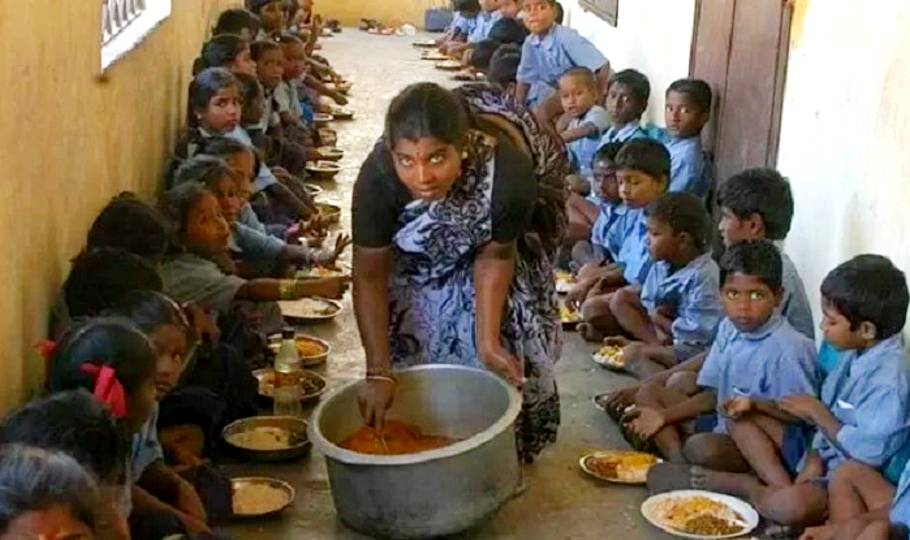
PM POSHAN: Meagre funds, rising prices eat into meals' nutrition levels
Most government and government-aided schools are cutting back on eggs, fish, and even dal, as the cooking cost per child per day is “abysmally low” amidst growing inflation

The mid-day meal scheme, which was renamed last year to align with its focus on a child’s nutritional needs, is losing its purpose due to inadequate allocation.
Most government and government-aided schools and madrasas in West Bengal are heavily compromising on nutritional values to run the scheme with the “abysmally low” cooking cost fixed for per child per day amidst growing inflation.
With effect from October 1, the Centre has increased the per day per child cooking cost to ₹5.45 from ₹4.97 for a primary and ₹8.17 from ₹7.45 for an upper primary student.
Also read: Punjab excels in national school education survey, while Telangana, UP falter
Insufficient hike
The hike, which is a measly 48 paisa for a primary and 72 paisa for an upper primary school child, is insufficient to maintain the mandated nutrition norm prescribed for the free meal considering growing inflation, stakeholders claim.
As per the norm of the scheme rechristened last year to Pradhan Mantri Poshan Shakti Nirman (PM-POSHAN), a primary-level student must get a serving of 20 grams of meal having nutritional value of 450 calories and 12 grams of protein. For upper primary student, the quantity of cooked meal per student is 40 grams having 700 calories and 20 grams of protein.
The material cost (earlier termed as cooking cost) includes prices of ingredients such as pulses, eggs, vegetables, cooking oil, salt, other condiments and fuel. Only rice is provided under the public distribution system.
Also read: TN ropes in self-help groups for school breakfast scheme, upsets many
As per the mid-day meal menu fixed by the West Bengal government in 2019, fish or eggs are to be served twice a week. On other days, the wholesome meal must include soya bean and vegetables along with dal and rice.
Rising prices
As prices of the ingredients required for providing nutritious meals have increased multi-fold since the cooking cost was last hiked two years ago, eggs/fish and even soya beans are disappearing from the menu in most institutions. An egg costs over ₹5 in wholesale markets in West Bengal.
“Forget about eggs and soya bean, with the current allocation it is difficult to even provide a simple meal of rice, dal and vegetables,” said Israul Mondal of Bengal Madrasah Education Forum.
He said almost all institutions have dropped eggs from their weekly menu chart, seriously compromising on nutrition.
Appeal to Centre, states
Considering the rising cost of materials, to provide nutritional meals according to the prescribed weekly food chart the per head allocation should have been at least ₹10, said Chandan Maiti, secretary of the Advanced Society for Headmasters and Headmistresses.
The society had been urging both the Centre and the state government to make the allocation realistic.
Also read | Breakfast scheme aimed at changing people’s lives, not freebie: MK Stalin
The All Bengal Teachers Association (ABTA) has appealed to both the governments to reconsider the allocation, said Sukumar Pyne, secretary of the association. The School Teachers Federation of India has also made a similar appeal.
The expenditure for the scheme is shared in a 60:40 ratio between the Centre and states, excluding North-Eastern states.
The West Bengal state government is already providing an additional amount of ₹500 to per cook-cum-helper per month from its own resources and hence it’s not in the position to dish out more funds over and above its share to support the scheme, said a state government official.
The monthly honorarium fixed by the Centre for the cook-cum-helper is ₹1,000, shared in a 60:40 ratio. The West Bengal government pays extra ₹500 to make the honorarium ₹1,500 per month.
Not enough fund allocation
The Centre has allocated ₹10,232 crore for the overall scheme in financial year 2022-23 while the states are to spend ₹6,277 crore. The Centre’s share for West Bengal for the year 2022-23 is ₹1,455 crore.
Also read: Meat in mid-day meal: Lakshadweep fights its battle in Supreme Court
“The budgetary allocation for the scheme this fiscal is 11 per cent lower than the budget estimate,” an official pointed out.
He said the Centre changed the name of the scheme stating that the focus should be to give nutritious food and not just any meal, but it did not increase the allocation.

